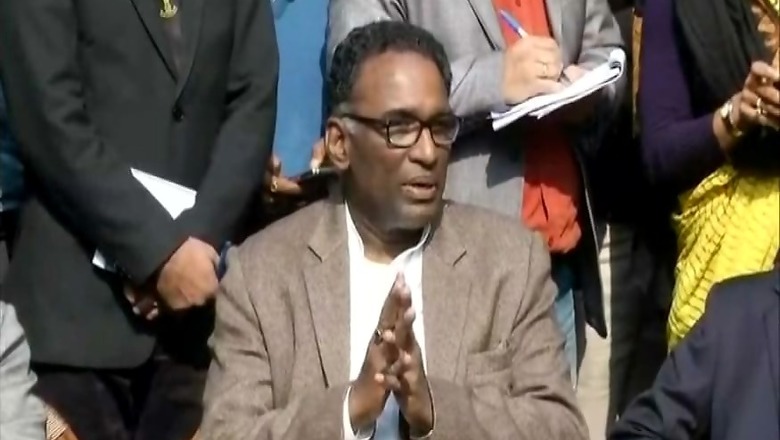
views
New Delhi: Had it been any other system, he would have been often referred to as the 'rebel'. But you don't use that term for a judge in India. And then there is a side to him which, unfortunately, has not got as much attention as his dissents.
Justice J Chelameswar, the second most senior judge in the Supreme Court, has frequently hit the headlines when he differed with his fellow judges — be it the judges' appointment case or judges' bribery case. Since many of these cases involved his brethren, his dissents were distinguished.
However, an assiduous look at Justice Chelameswar's tenure would be a testimony of someone, who has always spoken his mind as a person, and as a judge, delivered several landmark judgments which helped the jurisprudence evolve.
Let us set about with Justice Chelameswar's famous dissents in matters of judicial appointments.
The Supreme Court, by a 4:1 majority, struck down a constitutional amendment and thus the government's attempt to have a say in judges' appointments through the National Judicial Appointments Commission (NJAC).
Justice Chelameswar was the lone dissenter in 2015 when he said the Collegium system must go, for an exclusive authority to appoint judges was not the only means for an independent judiciary.
He asked the judiciary to introspect if the Collegium system has become “a euphemism for nepotism” where “mediocrity or even less” is promoted and a “constitutional disorder” does not look distant.
His judgment was seen by many as a ventilation of his personal sentiments since he missed out to be Chief Justice of India because of his delayed elevation by the Supreme Court Collegium.
But nobody can explain why even the other four judges on the bench, including the one who later went to become a CJI, shared the same opinion about revamping the process to appoint the judges and bring in more transparency?
Every judge on the Constitution Bench had criticised the Collegium system and pressed for changes. Justice Chelameswar, incidentally, happens to be the only one who decided to go the whole hog, citing empirical evidence from the last 20 years when judges’ appointments triggered controversies and decisions were taken behind closed doors.
Can you blame a judge for his attempts to reform a system, which has been denounced by every senior lawyer and every judge? Most judges do it after they retire but Justice Chelameswar is in fact the one who came out while in office, discharging his judicial functions.
The judge stirred up a hornets' nest yet again almost a year later. He wrote to the then CJI, informing him of his decision not to attend future meetings of the Collegium.
Why? The judge questioned the opaqueness and subjectivity of the Collegium system, in which the CJI would walk in with a list of pre-decided names, expecting other senior judges to follow the suit.
What did he ask for? Justice Chelameswar highlighted the need to maintain records, have some documentary notes of the deliberation process that would result in appointing the judges in this country.
But it was not that Justice Chelameswar brought the entire judges' appointment process to a grinding halt.
Conscious of his duty as a member of the Collegium, the judge clarified he was not recusing from the Collegium but would participate when the files with recommendations come to him by 'circulation'.
He even spoke to a few journalists expressing his dissent with the manner Collegium functioned — this made him perhaps the only judge in the top court who talked to media about an 'internal' and 'confidential' matter of the highest judiciary.
First thing first, there is no restriction on a judge to speak on public platforms or to talk to media. Hence, Justice Chelameswar broke no rule.
About his comments on the 'internal' and 'confidential' issues, can it even be argued that judges' appointment is a process which must be kept away from the public gaze and the consequential scrutiny of merit and objectivity because it might affect judiciary's independence?
There was nothing new that Justice Chelameswar had said in his letter -- which never was made public by him or his office. He said prepare records and maintain minutes of the Collegium meetings to have a structured system in place.
Supreme Court judges, who have always batted for transparency and proper record-keeping, cannot be and should not be seen as opposing this mandate when it comes to picking up judges in the country. And hence, what can exactly be wrong with one of their own asking to lead by example?
Second, if what Justice Chelameswar had raised was not proper, why the Collegium, a year after his dissent, passed the resolution to put all decision of the Collegium on the website? The resolution maintained that it was in the interest of transparency that records are held and they are made public.
Praises were heaped upon CJI Dipak Misra when the Collegium, which is headed by the CJI, started putting the decisions on the Court website. It was perhaps forgotten that another member of this Collegium, Justice Chelameswar, was the one who triggered this discourse about judicial accountability and transparency in judicial appointments a year ago and faced the criticism of being in opposition of his brother and sister judges.
And after these changes were brought in, Justice Chelameswar actually did start attending the Collegium meetings again
It will be pertinent to also mention here that when Justice Chelameswar wrote about not attending Collegium meetings in person, insinuations were made that he was unhappy about the Collegium not acceding to a request by a Kerala High Court judge to transfer him back to home state Andhra Pradesh. This HC judge happened to be a friend of his lawyer-son
But the records would reveal he started attending the Collegium meetings even though the transfer of this HC judge remained in a limbo. Further, the Collegium has recently cleared the transfer of this HC judge but the government has been sitting on the proposal for more than three months now — another explanation why it was baseless to suggest personal grudges as a reason for him to come out against the Collegium.




















Comments
0 comment